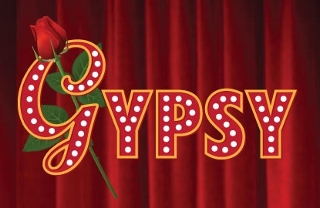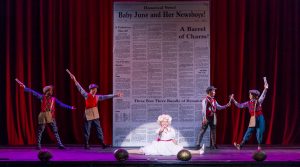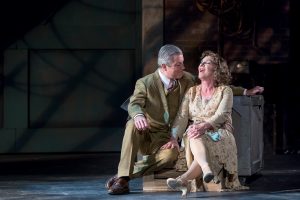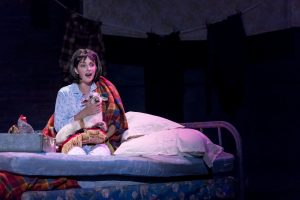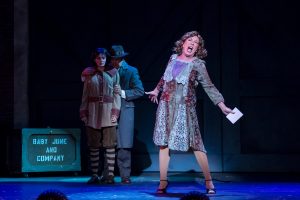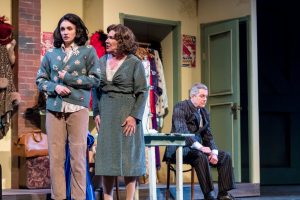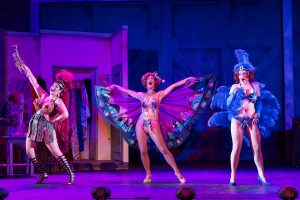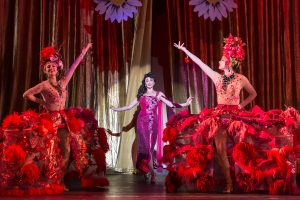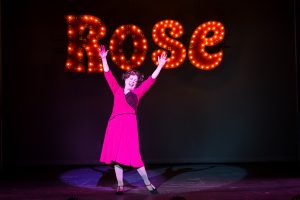TOUGH LOVE GONE HAYWIRE
Some people’”hey, that could be a song title!’”say Gypsy is the greatest Broadway musical ever written. And, calibrators of showbiz greatness, these folks may well be right.
It’s not just a stirring story of a prodigal daughter making good or a harridan matriarch morphing into a humble fan (confessing that for 20 years she was living vicariously through her daughters and not for them). It’s not just because Gypsy is that rare musical where every song either carries its weight, earns its place in the plot, conjures up its context (the era of vaudeville and the world of burlesque), or stands on its own for fertile melody and brilliant lyrics. Or because the story pulls you along, as frantically as Rose does her fractious and all-suffering thespian clan.
No, it’s mainly because Gypsy captures why we make musicals and see them’”the drive to exchange humdrum life for showbiz moxie, even if it’s a trick of the light, smoke and mirrors, a one-trick pony. The love of the art, with all its appalling and appealing truth and tinsel, propels this unstoppable plot to its dynamite ending.
Gypsy is as much a celebration of the addictive insanity of show business as a chronicle of the checkered childhood of super-stripper Gypsy Rose Lee. Sondheim’s crackling lyrics gave Jule Styne’s tunes whiplash wit and psychological heft. This slice of showbiz conjures up drafty auditions, unheated dressing rooms, crowded boarding houses, stolen cutlery, a traveling menagerie’”from Seattle to Wichita and across the yawning Depression. The detritus that Rose leaves behind as she ruins yet another marriage before its wedding defines theater as few shows can. The rest is legend.
However strong the story and diverse its travelogue, it’s essentially a vehicle for whoever plays Mama Rose, the mother hen to end all eggs. Ethel Merman grew the role, Bette Midler cured it (as in ham), and so many more’”Angela Lansbury, Patti LuPone, Tyne Daly, and locally, Alene Robertson, Louise Pitre, Rebecca Finnegan and Klea Blackhurst’”have detonated as the stage mother to’”unfortunately’”not end stage mothers. As often as they shout “Sing out, Louise!” or threaten with “You’ll Never Get Away From Me,” they finally had to speak the fateful line, “Why does everybody leave?”
In this powerful revival by Music Theater Works (formerly Light Opera Works), Mary Robin Roth rents, if not owns, the killer role. A born belter with leather lungs, but a “tiger mother” when she bursts into self-pitying tantrums and paranoid blame-throwing, Roth nonetheless sinks her show-stoppers in a character as clear as hunger. “A pioneer woman without a frontier,” Rose is every striver who’s sick of second billing when she can taste the marquee.
Compared to Rosalind Russell or even Bernadette Peters, Roth gives Rose even more friction burns and less eagerness to please. Take me or leave me, she declares, and they do in just that order. The real dynamo, who allegedly pulled a gun on her eventual son-in-law, didn’t give a damn. So in “Rose’s Turn,” a mad scene that’s both predictable and terrifying, Roth breaks down beautifully’”all her mother love suddenly congealing into burning rage over what SHE might have been, not Baby June or little Louise. Call it scream therapy, closure, an epiphany or catharsis’”it works on more than Mama Rose.
Framed by an old-style proscenium with vaudeville signboard announcing the many locales, Rudy Hogenmiller’s sumptuous staging surrounds Mama Rose with tailor-made triumphs, namely Russell Alan Rowe, down-to-earth as Rose’s patient suitor Herbie, Rosie Jo Neddy as the temperamental ex-Baby June, and, above all, Lexis Danca, a self-effacing Louise until she blossoms into Gypsy Rose Lee.
The show’s most cunning opportunity’”and attempt to distance her role from the memory of Natalie Wood in the film version’”comes when Danca does her first strip. Forgetting she’s supposed to be a lady (what set Gypsy off from the bump and grinders), she’s clearly angry at her mother and so much else. But slowly the joy of finally being seen and on her own terms overwhelms everything else and, yes, a star is born. That doesn’t quite happen on the Cahn Auditorium stage, however: We don’t see Louise consciously choosing to become Gypsy. That’s a pity (or, more charitably, an opening night failure of nerve).
That lost chance notwithstanding, Louise remains the ultimate late bloomer and ugly duckling turned striptease swan. It’s beautiful to watch the lovely Danca blossom from the self-effacing rear end of a cow into the famously intellectual stripper, as respectable an ecdysiast as ever scorched a stage.
Dedicated to industrial-strength make-believe, the 31-member cast explodes in torrents of talent as they play auditioning kids and their mothers, Boy Scouts, stagehands, newsboys, farmboys, Hollywood blondes, strippers, “stage door” Johnnies and assorted showgirls. Gypsies all.
With seventeen rapid-fire set changes, Joe C Klug’s scenery is slickly stylized until it’s hard to tell the real-life settings from Rose’s crudely improvised backdrops, one more culprit in the question of what killed vaudeville. That might be a problem if what’s up front weren’t so special, like Jeff Hendry’s exuberant and accurate costumes or Roger L. Bingaman conducting the captivating and irresistible 25-piece orchestra, as good as it gets, in the original Broadway orchestrations.
Or, for that matter, choreographer Clayton Cross’s charming semi-solo as dance-happy Tulsa crooning how “All I Need Is the Girl” (alas, it’s not Louise) or the never-more-hilarious trio “You’ve Gotta Get a Gimmick.” That too-brief song and dance’”and yes, even the novelty number with a trumpet, lights and pasties’”remind us exactly why we sit in our seats or, more importantly, don’t: Everything’s coming up Gypsy. Let them entertain you.
photos by Brett Beiner
Gypsy
Music Theater Works
Cahn Auditorium, 600 Emerson Street in Evanston
ends on August 27, 2017
for tickets, call 847.920.5360 or visit Music Theater Works
for more shows, visit Theatre in Chicago
